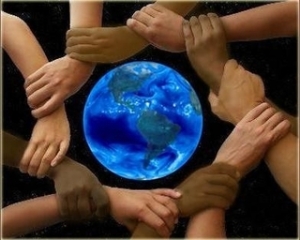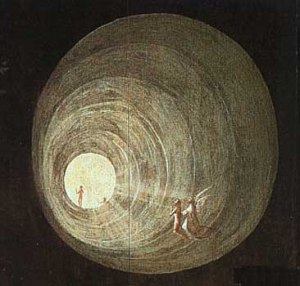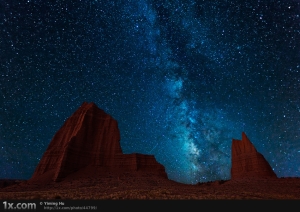
What am I even doing?! Am I crazy? I felt a little nervous that morning, as I loaded my kids in the van and headed towards St. Cuthbert’s Anglican church. I am a practicing Muslim, and I was about to sit through a Sunday service at a church, while my kids would be watched over in a nursery at that church. Even though it was my own idea to start this interfaith blog, and contact places of worship to visit and get to know some people, I was feeling a little uncomfortable. Why? Because I had never before been to a church service. “You’re feeling uncomfortable?” I asked myself. “Good! That means you’re on the right track.” I realized then that many of my experiences would feel uncomfortable in the beginning because it was a necessary process of familiarizing myself with people and places from different faiths.
I have made this commitment with myself that any time I feel “uncomfortable” with something simply because I know nothing about it or I don’t “feel” like doing something, I have to push myself and do it. Deliberately putting yourself in uncomfortable and new situations is one of the best techniques for personal growth. This is what I have come to realize through my various life experiments.
As I pulled into the parking lot, I saw Rev. Cheryl waiting outside for me. The church was in a beautiful neighborhood lined with big trees. I walked in, and was greeted by a young boy who handed us the program for the morning service. As I walked through the doorway into the church, I looked up at the beautiful wood ceiling. Rev. Cheryl explained how it was shaped like an upside down ship to symbolize the ship of life.
There were colorful stained glass window mosaics lining opposite sides of the wall. But surprisingly, they were devoid of any depictions of people and stories. There were a few small framed pictures hanging on the wall of sculptures depicting the Crucifixion. The walkway had a red carpet running through all the way to the front of the large room. There was a large red cross placed towards to the top of the wall, so that the people in the pews were facing it.
The Rev led us through another doorway into the lobby. My kids forgot about their shyness and ran towards a table laden with toy railway tracks and wooden trains. I breathed a sigh of relief, knowing they would be occupied while I got some work done. A sweet, young girl would supervise them while I sat through the service.
Back in the prayer room, I sat in one of the pews, my notebook and pen in hand. I noticed the smiling faces, many looking at me curiously. I smiled back and stood up and sat down with the congregation, as they chanted prayers from time to time. Then everyone was told to stand in the walkway in groups according to age, and a large plastic globe was passed down from one end to the other end, the goal being to keep the Earth up and not let it fall. I really loved the symbolism of the activity. The theme for this service was “Earth Day.”
I was quite impressed with the fact that the church had separate rooms and activities for young children, so that the ones who were old enough to pray would not be disturbed. Some children were taken outdoors to collect leaves for Earth Day. There was a large room with a table holding glasses of apple juice and a plate with strawberry wafers for the children. My kids got their share too.
There was another large activity room with a long table and small chairs, where the children would work on crafts. Then there was the nursery room with different toys to play with. The best part was that there was no extra fee for the nursery, nor the activities that involved the children.
I wish mosque administrations would visit churches to get some inspiration how to design the mosques space and what services to provide worshippers. I know for a fact how much people at mosques complain about children running through the prayer lines and disturbing the prayers. I have been to the mosque once in the last four years since my children were born, and the only way I did it was when my children were at a daycare centre not related to any mosque. I pray that I am alive for the day when I can walk into a mosque that has childcare provided for the mothers and fathers who make the effort to come to mosques with their families.
There were interesting moments during the prayers at church, such as when all of a sudden, everyone opened up what looked like foot rests stored underneath the row of pews in front, and then kneeled on them while grasping their hands in front. Then there was a moment when everyone turned to those around them, shaking their hands and wishing each other “peace.” As people came up to me, I quickly reached over, shaking their hand and returning their prayer of peace. I watched as Father Joe, who led the service, walked down the walkway, shaking people’s hands and wishing them peace. He came to me, his eyes meeting mine, as he said, “God’s peace,” to me. I returned his prayers. Everyone looked so happy and cheerful. I found myself turning around and shaking hands with more people.
I noticed that everyone at the church was very relaxed and happy. Even though I was an outsider, I didn’t for a second feel unwelcome or awkward. Everyone just let me be, and smiled at me from time to time. Father Joe also came up to me at some point and thanked me for coming in. It felt great to be acknowledged.
I thought about my experiences at mosques, and the main word that comes to my mind is “serious.” I don’t know why worshippers at mosques are mostly so serious and reserved. At the church, I felt this incredible energy of acceptance and love. Why can’t our community at mosques be more laid back like the Christians? I feel like we are so uptight as a community. It’s as though we are always looking out for who is breaking what religious rule so we can feel better about ourselves.
There were some really heart warming prayers that the congregation chanted that morning. I am listing some of my favorites below
1) When I see the heavens, the work of your fingers,
the moon and the stars which you arranged, what is man that you should keep him in mind, the son of man that you care for him?
Yet you have made him little lower than the angels;
with glory and honor you crowned him,
gave him power over the works of your hands;
and you put all things under his feet…”
2)Hear, O Isreal, the Lord our God,
the Lord is One.
Love the Lord your God
with all your heart,
with all your soul,
with all your mind,
and with all your strength.
This is the first and the
great commandment.
The second is like it:
Love your neighbor as yourself.
There is no commandment greater than these.
3) Every day we are reminded: all life depends on all life.
Everyday we forget: all life depends on all life.
Every day we learn: all life depends on all life.
4) Though we are many, we are one in creation, because we all share in the love of the Creator.
5) We have erred.
We have caused the extinction of species,
of cultures, of language, and
turned our backs to your Goodness
and each other.
In our darkness,
help us find courage
to grow in understanding
of ourselves, each other,
and our blessed Earth…
The service concluded with communion, which is where those wishing, went up to receive bread and wine.
As people streamed out of the prayer hall, we went into Father Joe’s office to chat with some parents and youth. My kids were put in Rev. Cheryl’s office, next door. They sat on the couch, watching the movie Home Alone, munching on chips and dipping their fingers in glitter glue and swirling them on paper. I am really grateful to Reverend Cheryl and the church administration for ensuring my children were entertained and safe so I could learn something about the people.
I had a lovely conversation with the parents and youth. The youth expressed how it was difficult each day to spend time with God and pray daily. They explained how they had busy lives outside of church, which is what made spirituality challenging. When I asked what it meant to be a good Christian, they said the following: to be a nice person, to do things for the community, go more regularly to church, taking care of people outside of church too, following the 10 commandments, and following the messages/lessons from the Bible stories.
One of the parents expressed how at the time he felt like God’s greatest blessing to his family was a Muslim lady, who had accepted his son into her daycare after he got removed from his previous daycare. The family would have had nowhere else to go, if she hadn’t taken their son under her care. He said, “Isn’t it so strange that God’s biggest blessing to me is a Muslim woman?” Then he said, “God bless her.” His words made me feel a sense of pride in my faith community. Her actions must have meant a lot to this family in order for him to speak so highly of her. I realized how we are so interconnected, and that we need each other’s support and kindness in order to keep our lives in order.
I listened to the parents talk, and it was amazing how many similarities all faith communities share. They talked about the bitter rivalries some Christians have with Christians from other denominations. One of them told of her wedding to her Catholic husband, and how her mother-in-law had threatened to boycott the event because her son was marrying an Anglican. They also expressed their concerns about the youth, and how many are leaving religion all together because of such hostilities between denominations and also because the way many concepts are preached don’t resonate with the young. These problems are not unique to the Christian community. Muslims also have more than our fair share of intra-religious conflicts and hostilities. And right now we have droves of young Muslim kids who feel no connection to their community and faith because of the failure of the clergy and scholars to change their teaching methods to adapt to a rapidly changing world.
The parents also expressed how although church sermons rarely bring up the topic of sex, sexuality and gender dynamics, they as parents discuss these issues with their children. And when I come to think of it, I have never heard of any mosque sermons targeted towards the youth with difficult topics such as sex. I only hope that the Muslim parents are being open enough with their children to have these difficult but necessary conversations.
As our discussion came to a close, everyone expressed their wish to reciprocate my gesture of visiting a church. They talked about how it was important for the youth to go visit, and learn about other faiths, because they went to school with friends who represented many faiths.
As I gathered my children, one of whom refused to put back the wooden train from the church, I remembered the one line of the prayer said at the service: All life depends on all life. Truly we do forget and yet are reminded daily that all life depends on all life.
We are all connected. We are here to remember God by realizing our utter dependence on His mercy; for we cannot even complete a single breath without His command. We are here to be kind to each other because we all depend on God and we all depend on each other to live our lives. This is the test of life. I certainly hope and pray we all pass this test.










